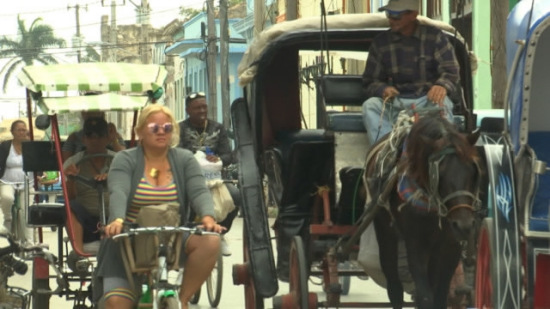
During the Special Period, Cuba swapped bikes for cars and horse-drawn carriages for buses. /CGTN Photo
How would the world survive if suddenly oil and gas supplies ran out? It's a problem Cubans know all too well, having suffered such a fate following the collapse of the Soviet Union in 1991.
The Cuban economy went into free fall, and there was widespread hunger. Despite a tightening of the trade embargo by the United States, Cuba pulled through.
In the second of his three-part series featuring key moments in history which have helped shape Cuba today, CGTN's Michael Voss looks at how Cubans adapted to the hardships faced in what became known as the Special Period.
Stories in this series:
Cuba past and present: Independence
Cardenas is an industrial town on the north coast of Cuba, not far from the island's famous resort beaches of Varadero.
Visit the town during rush hour and it is surprising how few cars and buses can be seen on the streets. Instead, most people here travel on bicycles or horse-drawn carriages.
It's a town which prides itself on its use of alternative forms of transport. At one entrance, there is a statue of a giant bicycle.
But for many Cubans, bicycles are a grim reminder of the tough times everyone faced following the collapse of the Soviet Union.
Martha Nunez is a retired sociologist who remembers living through the period.
"I rode a bicycle for a year and half. I will never ride a bicycle anymore," she told me.
Like almost everyone who lived through the early 1990s, these were the hardest days of her life.
"All of a sudden, all of us had nothing, nothing. No energy, no electricity, no water, no soap, no nothing." Nuñez remembers.
Cuba and the Soviet Union
Shortly after the revolution, Fidel Castro turned to the Soviet Union following the trade embargo imposed by the United States.
The Soviets ended up buying all the sugar Cuba could produce at inflated prices and selling it for low-cost oil at subsidized rates. Cuba had become dependent on the Soviet Union for around 80 percent of its international trade.
Then suddenly, as communism collapsed across Eastern Europe and the Soviet Union, Cuba's foreign trade all dried up.
According to University of Havana economist Juan Triana, gross domestic product fell by almost 34 percent while the fiscal deficit went up to 35 percent.
Fidel Castro announced his country had entered a "Special Period in a Time of Peace," comparing the ensuing deprivations to a wartime siege.
Delia Lopez is co-author of a recently published book on the Special Period.
"The impact was brutal. Since having no oil, we could not operate our factories, do agriculture, while the homes had no power," said Lopez.
Cuba ended up importing more than a million bicycles from China because it had run out of fuel for cars.
In the countryside, tractors were replaced by oxen which can still be seen ploughing the fields all over the island.
Without fertilizers or fuel for irrigation, there were severe food shortages. Many went hungry and lost weight.


















































